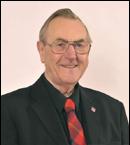
A prominent Scottish academic has given his backing to a campaign that is being run by the Kernow branch of the Celtic League. Professor Kenneth MacKinnon, who is a world renowned Celtic scholar, said in a letter to Kernow branch secretary Michael Chappell that following Mr Chappell's letter response from the National Trust (NT), he too had written to them with a few comments of his own.
A prominent Scottish academic has given his backing to a campaign that is being run by the Kernow branch of the Celtic League.
Professor Kenneth MacKinnon, who is a world renowned Celtic scholar, said in a letter to Kernow branch secretary Michael Chappell that following Mr Chappell's letter response from the National Trust (NT), he too had written to them with a few comments of his own. In his letter, Professor MacKinnon told Shona Owen, the Communications and Marketing Officer of the National Trust in Cornwall, that even though he took her "point very seriously regarding the need to minimise signage in regard to unspoilt and uncluttered historic landscapes", he felt that other aspects of her letter were misinformed. As a consultant to similar charitable organisations in Scotland, Professor MacKinnon said that he was "at a loss to understand the point you [Owen] make that Cornish language signage 'has the potential to undermine aspects of our charitable core purpose'." Professor MacKinnon added that:
"As you are a charity constituted to promote the heritage of the countries in which you operate, I would rather have thought that the reverse was the case."
Professor MacKinnon continued:
"You make a point regarding official status of Cornish that, 'Clearly this is not the case in Cornwall.' I feel that you should have taken further advice on this before making such a statement. HM Government signed the European Charter for Regional or Minority Languages in regard to Cornish and this was registered on 18th March 2003. As the result of a parliamentary question to the government on the official status of languages so registered, Lord Evans of Temple Guiting provided an official ruling that such action provided governmental recognition of such languages as 'official languages of the UK'. (House of Lords 12th June 2003.) As this is a matter of factual parliamentary record I feel that you should look further into this, and to revise your policies accordingly.
"Incidentally your view that Welsh is the first language of around 10% of the Welsh population is also probably somewhat inaccurate. At the 2001 census, some 582,368 or 20.8% of persons of three years and over were returned as speaking Welsh. There are no official statistics whether these are 'first-language' speakers or otherwise. However this is irrelevant to the issues involved. The official status of languages is not dependent on numbers or proportions of speakers, or the means of language acquisition. In Wales the Welsh Language Board has the statutory duty to make Welsh language schemes binding upon statutory authorities and public bodies, and it also engages with commercial and voluntary bodies in a similar although voluntary capacity, which would seem to be the case with the Trust. I am not sure whether this is actually 'obligatory' as you seem to believe, and you were in fact doing this many years before the Welsh Language Acts or the commencement of the Welsh Language Board. Your use of Welsh is probably not obligatory as such, and there is therefore every reason for a similar policy of goodwill to be the case regarding Cornish.
"The explanation of placenames is indeed a matter of interest to site visitors, and the Trust does in fact provide some information regarding this. I have visited Trengwainton Gardens a couple of times and on the earlier occasion I raised the matter of the placename which was explained as the farmstead 'of the springs'. The placename actually refers to the Spring of the year. This is a completely different word in Cornish from the spring of water issuing from the ground. This erroneous explanation was still being perpetuated when I visited again later. Perhaps it still is. Regarding placenames it would be very useful for the Trust to consult recognised specialists in Cornish placenames such as Craig Weatherhill and Oliver Padel. The latter is also or has been I believe president of the English Place Names Society. "
Professor MacKinnon said that he had been in touch with Jenefer Lowe from the Cornish language group MAGA about the issue and agreed with her that there are a number of initiatives run by the NT in Cornwall, which are already featuring Cornish in various ways. Professor MacKinnon argued that these "provide a very positive starting pint and a means whereby further involvement can be developed on a step-by-step basis."
Mr Chappell is awaiting a further response from Shona Owen and so is Professor MacKinnon, but the press in Cornwall meanwhile has reported on the issue, which has given the matter a much need public airing.
Links:
http://groups.yahoo.com/group/celtic_league/message/3208 http://groups.yahoo.com/group/celtic_league/message/3207J B Moffatt Director of Information Celtic League
21/01/10
 The Celtic League has branches in the six Celtic Countries. It works to promote cooperation between these countries and campaigns on a broad range of political, cultural and environmental matters. It highlights human rights abuse, monitors all military activity and focuses on socio-economic issues.
TEL (UK) 01624 877918
MOBILE (UK)07624 491609
(voir le site)
The Celtic League has branches in the six Celtic Countries. It works to promote cooperation between these countries and campaigns on a broad range of political, cultural and environmental matters. It highlights human rights abuse, monitors all military activity and focuses on socio-economic issues.
TEL (UK) 01624 877918
MOBILE (UK)07624 491609
(voir le site)

Commentaires (0)
Aucun commentaire pour le moment. Soyez le premier à réagir !